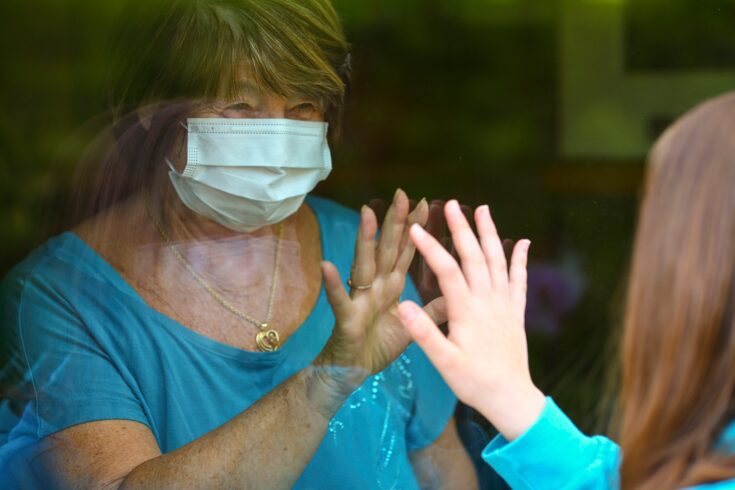Wearing a face mask has become commonplace in the UK in a variety of indoor settings like supermarkets, bars and restaurants and on public transport.
Face masks are routinely worn by people in Asian countries, but until the COVID-19 pandemic they were rarely used outside healthcare settings in the UK.
UK Research and Innovation (UKRI) has funded a range of projects that investigated:
- whether masks were effective in reducing the transmission of the virus
- which types of masks were most effective
- how to design them for maximum effectiveness.
Blocking COVID-linked droplets
A study conducted by researchers at the University of Edinburgh showed that speaking and coughing without face protection exposes people nearby to virus-laden droplets. This would otherwise be stopped by wearing a mask.
The team compared the number of droplets that landed on a surface in front of a person coughing and speaking with and without a surgical mask or a basic cotton face covering.
Tests were carried out on people and a life-sized anatomical human model connected to a machine that simulates coughs and speech.
The analysis found that the number of droplets was more than 1,000 times lower even when wearing a single layer cotton mask.
The study was part-funded by the Engineering and Physical Sciences Research Council (EPSRC).
Effective against larger, virus-laden droplets
Lead researcher Dr Ignazio Maria Viola, of the University of Edinburgh’s School of Engineering, said:
We knew face masks of various materials are effective to a different extent in filtering small droplets.
However, when we looked specifically at those larger droplets that are thought to be the most dangerous, we discovered that even the simplest handmade single-layer cotton mask is tremendously effective.
See the pre-print publication of the study (medRxiv).
Are non-surgical masks effective?
As masks became mandatory, there was a lack of evidence about whether the simple, non-surgical masks available to the public would be effective.
Another UKRI-funded project at the University of Surrey put this to the test.
They looked at how liquid droplets are captured and filtered out in cloth masks by reviewing and modelling filtration processes.
The team found that, under ideal conditions and dependent on the fit, three-layered cloth masks can perform similarly to surgical masks for filtering droplets.
Both reduce exposure by around 50 to 75%. So if an infected person and a healthy individual are both wearing masks, the team believe this could result in up to 94% less exposure.
Dr Richard Sear, co-author of the study and Leader of the Soft Matter Group at the University of Surrey, said he hoped their work would inspire mask designs to be optimised in the future.
Custom-fit masks in 24 hours
Properly-fitted masks were the focus of a project funded by UKRI, which took university research to the start-up stage.
The MyMaskFit project began in April 2020 when scientists from the University of Birmingham and King’s College London recognised the shortcomings of the masks available for healthcare workers.
According to the researchers, medical-grade masks don’t fit the faces of more than 15% of the population.
The team brought together expertise in:
- facial imaging
- skin interfacing devices
- 3D printing.
The early stage of the project was supported by ESPRC as part of the UKRI COVID-19 response.
The result was a prototype for a customised seal to reduce the risk of exposure and the time it takes to fit the mask. The prototype also improved comfort for healthcare workers and others who need to wear higher-grade, filtering masks all day.
Turning research into a product
The universities involved filed patent applications and licensed the rights to the new company MyMaskFit.
The commercial side aimed to create custom-fit, medical-grade masks to fit people of all ages regardless of age, sex or ethnicity, within 24 hours. Innovate UK funding supported this second phase.
Dr James Wilkie, CEO of University of Birmingham Enterprise, which filed the Birmingham patents, said:
This is a fantastic example of bringing university research ideas to market quickly so they can improve people’s lives as soon as possible.
MyMaskFit is taking the product through regulatory approval to bring it to market.
Masks with virus velcro
Scientists at the University of Lincoln have developed a new formulation for face covering filters that retain up to 99.6% of the virus.
The team received funding from Research England for the innovation, which has already been recognised by an independent standards laboratory.
Seaweed extract fucoidan sticks and immobilises the virus onto surfaces, and its coronavirus-defying properties were identified during the early phase of the pandemic.
However, fucoidan is expensive and difficult to obtain in the UK.
The University of Lincoln team developed formulae with similar outcomes, using cheaper and more readily available materials.
They tested their formulation on biodegradable filter fibres that can be used for face masks. They found that the fibres act like virus velcro, trapping the virus without making the mask uncomfortable.
Associate Professor Nick Tucker, a specialist in materials and manufacturing at the University of Lincoln’s School of Engineering, said:
As restrictions are eased and life is gradually returning to pre-pandemic normality, these filters could prove crucial in preventing further rising rates of coronavirus.
We knew that to make a successful contribution in the struggle against the pandemic we needed to assemble a complete supply chain for our discoveries and all the supply chain members need to be fully involved from the start.
The connection between design, science and engineering is important too, it is no good inventing a formulation that is too expensive or too difficult to make.
The team is currently sourcing development partners for the project.
Last updated: 19 January 2022

